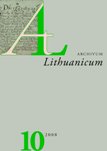XVII amžiaus Ukmergės teismų lietuviškos priesaikos ir jų kalbos santykis su dabartine širvintiškių patarme
Seventeenth and eighteenth century Lithuanian oaths of Ukmergė town courts and their relationship with the present Širvintiškiai dialect
Author(s): Aurimas MarkevičiusSubject(s): Theoretical Linguistics, Phonetics / Phonology, Baltic Languages, 17th Century, 18th Century
Published by: Lietuvių Kalbos Institutas
Keywords: 17th-18th century; Dialect; Lithuanian oaths; Ukmerge; town court; Archivium Philologicum;
Summary/Abstract: In 1937 Konstantinas Jablonskis published four Lithuanian Court oaths of Ukmergė (one oath had been written beforehand in 1634, two in 1669 and one in 1675) in the sixth volume of the journal Archivum Philologicum. The article also contains a public presentation of three oaths from the books of the Upytė Land Court (of 1624, 1642, and 1653). The files related to the court cases used to be stored in the Manuscript Department of the Vilnius University Library. Unfortunately, full files containing all the aforementioned seven oaths have been torn out of the original Ukmergė manuscript courtbooks. In 2004, Domininkas Burba published three more seventeenth century Ukmergė Court oaths (dating 1648, 1675, and 1677) including facsimiles of the originals. The language of the Ukmergė Court oaths is variegated. Although Ukmergė belongs to the territory of the East Highland (Rytų Aukštaitija) Širvintiškiai subdialect, only two of the 1669 oaths and one oath dating 1675 were written in the East Highland dialect. The aforementioned oaths reflect the transformation of the diphthongs [an], [am], [en], [em] into the diphthongs [un], [um], [in], [im], as well as the retention of the old vowel [ā] in unstressed syllables (both oaths of 1669 contain it also in stressed syllables) and other peculiarities typical of the aforementioned dialect. The remaining four oaths have been edited according to the standards of the middle variant of the sixteenth and seventeenth century written language, which was created by Mikalojus Daukša and other authors of the period. The number of East Highland dialectal forms is very scarce in the latter writings.
Journal: Archivum Lithuanicum
- Issue Year: 2008
- Issue No: 10
- Page Range: 97-110
- Page Count: 14
- Language: Lithuanian

